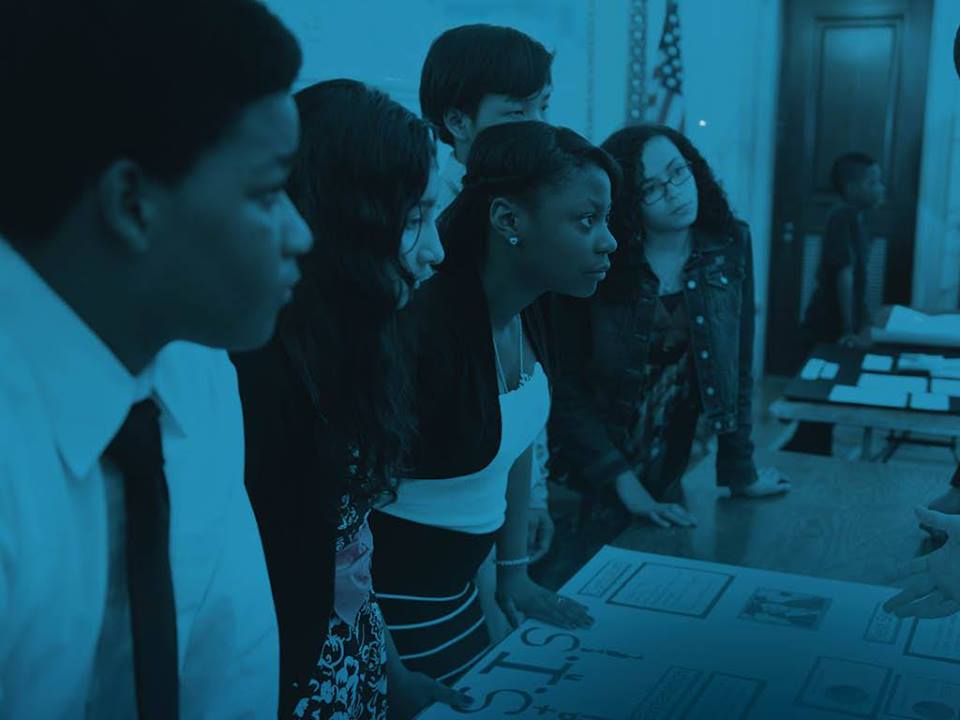The Greater Boston hackathon will take place on Saturday, November 5, 2016
Sign-up to Participate in the Civic Tech Challenge Hackathon
Buy Tickets to the Civic Tech Challenge Awards Reception
Generation Citizen’s Civic Tech Challenge brings together top tech innovators and passionate middle school students for a day-long hackathon that will create solutions to tough local issues. The day-long hackathon is followed by an evening presentation and reception.
How the Civic Tech Challenge Works: Two Students Share their Experience
Sabrina and Kevin, two students from Mr. Andrews’ 7th-grade classroom at Josiah Quincy Upper School in Boston, attended the Generation Citizen Civic Tech Challenge last fall. Here they share their experiences and how their participation in the Civic Tech Challenge made an impact.
Step 1. The Classroom Chooses an Issue Project: Homelessness
As part of the Generation Citizen action civics program that partnered with Mr. Andrews’ class, students used a consensus process to choose one local issue that deeply affected their community. Sabrina, Kevin, and their classmates came to a consensus on the issue of homelessness.
“A lot of people are homeless each year and they need our help. It’s sad that families are either out on the streets or are in shelters.” – Sabrina
Step 2. A Policy Solution is Identified: MA House Bill 119
Generation Citizen prompts students to identify policy solutions to social issues, so youth learn to use the political process to make change. Students researched policy ideas proposed for local homelessness and found MA House Bill 119, An Act to End Child Homelessness, which, if passed, would make it so families with children under the age of 18 could not be evicted from public housing until they had new and safe place to live.
“Bill H.119 prevents low-income families with a child eighteen or younger from being evicted. It will decrease the number of homeless children. I think it is important because it will give children, like me, a home to call home.” – Kevin
Step 3. Students Meet Hackers at the Civic Tech Challenge Hackathon
At 2015’s Civic Tech Challenge hackathon, Sabrina, Kevin and their classmates joined with local developers, designers, and digital marketers to create civic tech innovations that would advance the students’ project on homelessness. The hackers on Sabrina and Kevin’s team worked with them over the course of the day-long hackathon and pushed them to think about their case for Bill H119 and how technology could help them make a stronger case.
“[The hackers] made us think about the problem and how we would present it. They told us some information that we didn’t really know. They made a few jokes here and there. It made me excited to be outside of school and still learn a lot of stuff.” – Sabrina
Step 4. The Result: A Data Visualization and a Website
The team of hackers and students created a data visualization that showed that homelessness, especially youth homelessness, is growing in Massachusetts at a rate that outpaces other states. The team built the data visualization into a website that also included student testimonials, information about Bill H119, and a petition to get involved.
“I had never done a website before. It was exciting and interesting to learn how they created a website.” – Kevin
Step 5. Hackathon Innovations are Presented at the Civic Tech Challenge Reception
After the day-long hackathon, students and hackers presented their innovations to an audience of 250 Greater Boston innovators and a Judging Panel of civic and tech community leaders. Watch the video of Sabrina and Kevin’s presentation.
“We had to speak at the end of the day to other people. I was nervous about that. I tried to stay calm and tried not to think about it that much. It actually went okay!” – Sabrina
Step 6. Using Civic Tech Challenge Hackathon Innovations to Lead Change: Lobby Day
After the Civic Tech Challenge, students continued working on their Generation Citizen project by organizing a Lobby Day at the Massachusetts State House. Students visited the State House and met the state legislators who were part of the Committee for Families, Children, and Persons with Disabilities, where Bill H119 currently resided. Students included their data visualization and their website in their pitches about the bill, so that they could make the case to their legislators even stronger.
“I liked going to the State House and hearing from the people there who work there about the bill. I knew they were kind of famous people. Or not famous people, but a level higher than me. And it made me nervous, I didn’t know what they were going to say. But I tried to have the courage and speak up. It went great.” – Sabrina
Step 7. Students Become Politically Active Leaders of Change
Following Lobby Day, students continued to write and call their legislators to advance Bill H119. (The bill remained in Committee during last year’s legislative session, but is expected to be refiled in the next session). Students also presented their projects, including their data visualization and website, at Generation Citizen’s Civics Day in December 2015. At the end of the Generation Citizen semester, students showed positive growth in civic leadership skills, knowledge about the political process, and sense of agency that they could be involved in politics, too. The Civic Tech Challenge – and all the hackers, audience members, Judges, and sponsors that participated – helped make this growth possible for Sabrina, Kevin, and their classmates.
“I like Generation Citizen because we can impact our community. We can do hands on projects and learn more about politics and how some people in the world do this all day long.” – Kevin
